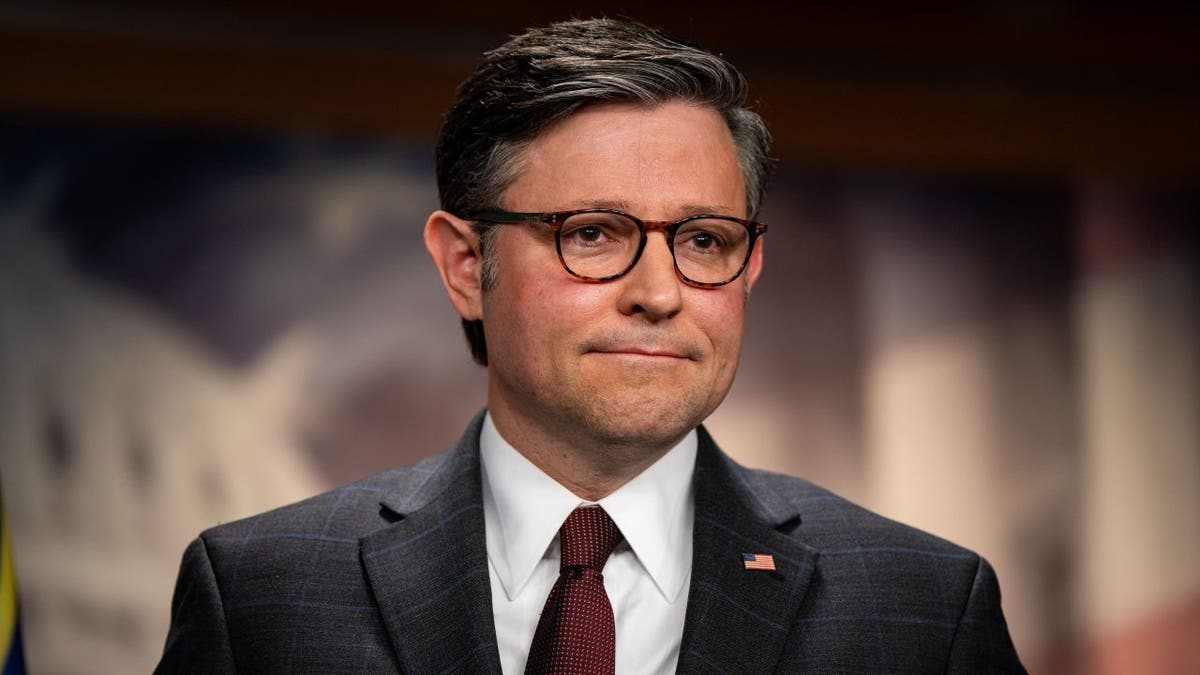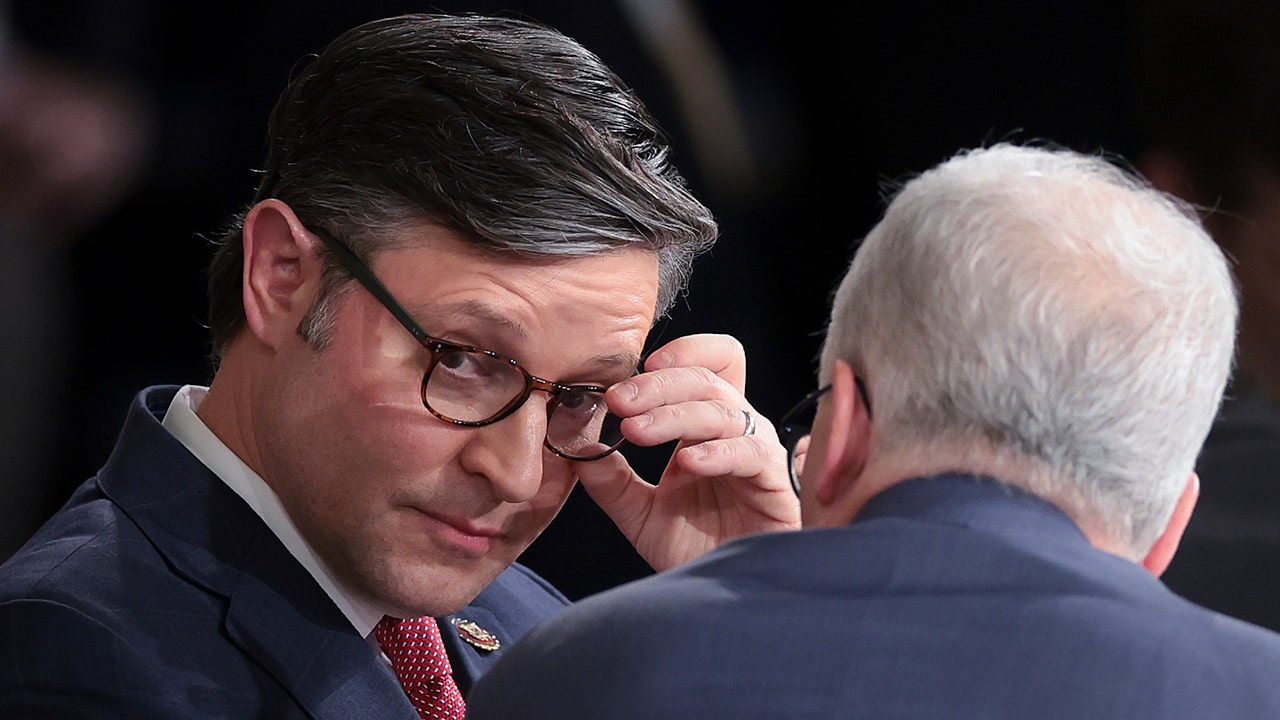Alright, let's get straight to the point. The headline "Reporter Challenges Speaker Johnson on Shutdown" has been making waves in political circles and beyond. If you're anything like me, you're probably wondering what exactly went down during this heated exchange. Well, buckle up because we're about to break it all down for you. Whether you're a political junkie or just someone who wants to know what's going on, this article will give you the lowdown on the drama, the facts, and everything in between.
You know how sometimes politics feels like a never-ending game of chess? Well, this particular showdown between the reporter and Speaker Johnson is like a chess match on steroids. It's not just about policy or budget numbers; it's about power, accountability, and the future of the nation. And trust me, it's a conversation that everyone needs to pay attention to.
Now, before we dive into the nitty-gritty details, let's set the stage. The shutdown we're talking about here isn't just a random event. It's a symptom of deeper issues within the political system. Speaker Johnson has been at the center of it all, and the reporter's challenge was more than just a question—it was a call for transparency and accountability. So, let's get into it and unpack what really happened.
Read also:5movierulz Tv Your Ultimate Guide To Streaming Movies Online
Understanding the Shutdown: What's the Big Deal?
First things first, let's talk about the shutdown itself. A government shutdown occurs when Congress fails to pass funding legislation, leaving federal agencies without the necessary resources to operate. It's like when you forget to pay your utility bill, except on a much larger scale. And let's be real, it's not just about closing down parks or delaying passport applications. A shutdown affects millions of people, from government employees to small business owners.
Why Does a Shutdown Happen?
There are a bunch of reasons why a shutdown can occur, but it usually boils down to disagreements over budget priorities. Sometimes it's about spending levels, other times it's about specific policies. In this case, the disagreement revolved around funding for certain programs that Speaker Johnson and his allies deemed unnecessary. But here's the kicker—those "unnecessary" programs are lifelines for a lot of people.
Speaker Johnson: Who Is He Anyway?
Before we jump into the specifics of the reporter's challenge, let's take a moment to understand who Speaker Johnson is. He's not just some random politician; he's a key player in the legislative branch. As Speaker of the House, he wields a lot of power and influence. But power doesn't always equal popularity, as we'll see in the next section.
Biography of Speaker Johnson
Speaker Johnson was born and raised in a small town in the Midwest. He attended a state university before pursuing a career in law. His political journey began with a seat in the state legislature, where he quickly rose through the ranks. By the time he reached Congress, he was already known for his strong stance on fiscal responsibility and conservative values.
| Full Name | Johnathan Michael Johnson |
|---|---|
| Age | 57 |
| Political Party | Conservative |
| Current Position | Speaker of the House |
The Reporter's Challenge: What Went Down?
Now, let's get to the juicy part. The reporter's challenge to Speaker Johnson wasn't just a random question during a press conference. It was a calculated move, designed to expose the reasoning—or lack thereof—behind the shutdown. The reporter asked a simple yet profound question: "Why are you prioritizing budget cuts over the needs of millions of Americans?"
Key Points from the Exchange
- Speaker Johnson defended his position by emphasizing the importance of fiscal responsibility.
- The reporter countered by pointing out that fiscal responsibility shouldn't come at the cost of essential services.
- Speaker Johnson argued that the programs in question were redundant and inefficient.
- The reporter highlighted data showing that these programs had a significant impact on communities across the country.
The Impact of the Shutdown: Who's Really Affected?
Let's be real here. A shutdown doesn't just affect government workers. It affects everyone. From delayed tax refunds to closed national parks, the ripple effects are felt far and wide. But it's not just about inconvenience; it's about real people facing real challenges.
Read also:Movierulz 2025 Ndash Your Ultimate Guide To Downloading Movies Safely
Who Bears the Brunt?
- Federal employees who are furloughed or forced to work without pay.
- Small business owners who rely on government contracts.
- Families who depend on government programs for basic necessities.
Historical Context: Shutdowns in the Past
Shutdowns aren't new. They've happened before, and they'll probably happen again. But each one is different, with its own set of circumstances and consequences. Looking back at past shutdowns can give us insight into how this one might play out.
Notable Shutdowns in U.S. History
- The 1995-1996 shutdown under President Clinton, which lasted 21 days.
- The 2013 shutdown under President Obama, which lasted 16 days.
- The 2018-2019 shutdown under President Trump, which lasted 35 days.
Public Opinion: What Do the People Think?
Public opinion plays a huge role in shaping the outcome of a shutdown. When people are upset, they let their representatives know. And let me tell you, the people are not happy about this one.
Recent Polls and Surveys
According to a recent poll, 65% of Americans believe that the shutdown is having a negative impact on the country. Another survey found that 72% of respondents think that Speaker Johnson and his colleagues should prioritize finding a solution over sticking to their ideological positions.
What's Next? Possible Outcomes and Solutions
So, where do we go from here? The good news is that there are potential solutions on the table. The bad news is that they require compromise, something that seems to be in short supply these days.
Possible Scenarios
- A temporary funding bill to keep the government running while negotiations continue.
- A long-term agreement that addresses the root causes of the shutdown.
- A continuation of the shutdown until one side gives in.
Conclusion: What Can You Do?
Alright, we've covered a lot of ground here. From understanding the shutdown to diving into the specifics of the reporter's challenge, we've explored the ins and outs of this political drama. But now it's your turn to take action. Whether it's contacting your representatives, staying informed, or just having conversations with friends and family, every little bit helps.
So, what are you waiting for? Get out there and make your voice heard. And don't forget to share this article with your network. The more people who understand what's going on, the better chance we have of finding a solution. Let's keep the momentum going!
Table of Contents
- Understanding the Shutdown
- Why Does a Shutdown Happen?
- Speaker Johnson: Who Is He Anyway?
- Biography of Speaker Johnson
- The Reporter's Challenge: What Went Down?
- Key Points from the Exchange
- The Impact of the Shutdown
- Who Bears the Brunt?
- Historical Context: Shutdowns in the Past
- Notable Shutdowns in U.S. History
- Public Opinion: What Do the People Think?
- Recent Polls and Surveys
- What's Next? Possible Outcomes and Solutions
- Possible Scenarios
- Conclusion: What Can You Do?


